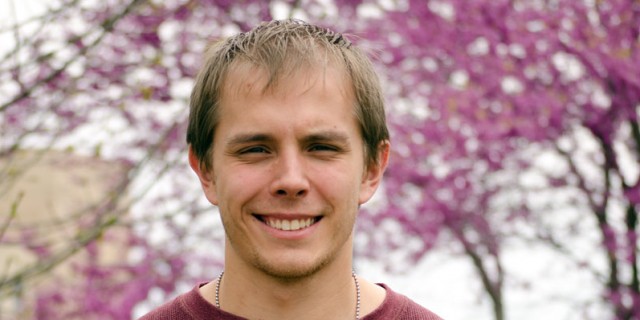Marcus Florez, B.S. in chemistry, Class of 2015
If it weren’t for Marcus Florez being expelled, he may never have become a promising young Alzheimer’s researcher.
Florez, a senior from Bel Aire, had a wake-up call at the young age of 14. He describes himself as a troubled kid, who was frequently suspended and finally, expelled, from middle school. That expulsion proved to be a crucial turning point.
“When I went to high school, this was my last chance to do something with my life. If I don’t do this, I’m going to end up with just a high school degree, or not finish high school,” he said.
He set a tough goal, attaining a 4.0 every semester in high school, and he succeeded. He graduated as a valedictorian from his high school. Florez said he was able to enter high school at the same level as other students because of family support to keep his education on track.
“My dad, growing up, he would spend all his time trying to give me the life that he didn’t have. Every summer he would give me science books and challenge me in math. His guidance was the primary reason I was able to not get held back when I was expelled from school,” Florez said.
Looking at colleges, Florez knew he wanted to pursue a field related to his favorite subjects, science and math. And he wanted to pursue a medical career, which would allow him to help others. He also knew the University of Kansas was the best in the state for any of those pursuits, but he considered it a back-up to Yale or Duke. He wasn’t admitted to either, which in hindsight, was fortuitous for his development as a scholar.
“It’s been amazing (at KU) and I wouldn’t go back and change that,” Florez said. “Practically every professor I had in one of my classes mentored me.”
It was through the support of his professors, in fact, that led Florez to begin researching Alzheimer’s. He discovered those professors and research subject almost by chance.
“When I came here, my roommate said, do biochemistry because that’s what I’m going to do and it’s good for medical school,” he said.
Florez began taking chemistry classes, one of which was an honors seminar with Mikhail Barybin, a chemistry professor. That class opened his eyes to the possibilities of research.
“At the very end of the semester he said we needed to choose a research topic, find some articles on it, and then present it to the class. I chose Alzheimer’s disease because my grandfather died from it when I was in middle school and I didn’t really understand the disease,” he said. “So I chose that and reading the articles, I found it really fascinating.”
After the course, Florez talked to his professor about getting involved in research at KU. Florez looked up professors online to learn more about their research and discovered the lab of Elias Michaelis, a distinguished professor of pharmacy. Through that experience, he’s gained a deeper understanding of a puzzling disease, Alzheimer’s. He’s also gained a newfound appreciation for mitochondria.
“My work here is primarily based on the organelle mitochondria, the energy powerhouse of the cells. There are so many things I’ve learned about the mitochondria that I never knew. In high school they just show this little picture of this beanlike structure,” Florez said. “What I have really liked about my work in general is that I learned that mitochondria have their own DNA, and that mitochondria as a whole is inherited maternally.”
Research has been central to Florez’s experience at KU. He’s been an ambassador for the Center for Undergraduate Research, a member of the Initiative for Maximizing Student Development at KU and the KU Multicultural Scholars Program.
Florez has begun to make a name for himself already as a researcher. He held two summer research positions, one at Harvard University and the other at Johns Hopkins University. Both were made possible through the encouragement of the Initiative for Maximizing Student Development Program. This fall, he was among 99 out of 900 student presenters recognized with a Student Presentation Award at the Society for Advancement of Hispanics/Chicanos and Native Americans in Science. Most recently, he received a Class of 1913 award from KU, one of the prestigious University Awards bestowed upon graduating seniors.
He credits the support of professors who pointed him toward opportunities he might not have otherwise known about or considered.
“They’ve really shaped my thinking and my future in general. They’re the primary reason that everything’s happened for me here,” Florez said.
After graduation, Florez will take a year to expand on his research and prepare for medical school as a post-baccalaureate scholar. He plans to apply to Medical Scientist Training Programs where he can complete both a doctorate and medical degree so he can continue with research but also treat patients.
Looking at where he is now compared with where he was before and after high school, Florez said his life has been “completely transformed.” Recently, when he was stressed out with school work and preparing for the MCATs, he was reminded by his dad how far he’s come.
“I asked him, ‘What if I can’t pass the MCAT and get into medical school?’ He said, ‘I’m proud of you, everything you’ve done so far, you’ve made me proud.’”
